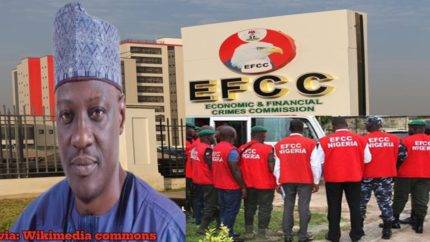Unveiling grave accusations by the EFCC against former Governor Abdulfattah Ahmed, alleging misappropriation of N1.6 billion in state funds for personal use, notably chartering private jets. Dive into the scandal raising concerns about financial integrity and governance ethics now!
Allegations Against Abdulfattah Ahmed
The Economic and Financial Crimes Commission (EFCC) has leveled grave accusations against former Kwara State Governor, Abdulfattah Ahmed, alleging the misappropriation of funds designated for the state’s security and operational expenses. According to the EFCC, Ahmed purportedly diverted a substantial sum of N1.6 billion for personal use, notably in chartering private jets through Travel Messengers Limited. These funds, originally earmarked for essential government functions, were allegedly utilized for Ahmed’s local travels between 2015 and 2019, raising serious concerns about financial integrity and ethical governance.
These allegations, if proven true, constitute a significant breach of trust and highlight the urgent need for robust accountability mechanisms within the state’s governance structure. The revelation of such actions has sparked public outrage and emphasizes the imperative of holding elected officials accountable for their stewardship of public resources to ensure transparency and prevent abuse of power.
Implications for Kwara State’s Governance
The allegations against Abdulfattah Ahmed carry profound implications for Kwara State’s governance framework, raising questions about the effectiveness of financial oversight mechanisms and the integrity of its leadership. With substantial funds allegedly diverted from critical government expenditures, concerns regarding the state’s stability and public trust in governance have been exacerbated. The misuse of funds allocated for security and operational purposes not only jeopardizes the state’s welfare but also undermines citizens’ confidence in their government’s ability to manage finances responsibly.
These revelations underscore the pressing need for enhanced transparency, accountability, and institutional reforms within Kwara State’s governance apparatus. Strengthening regulatory frameworks and implementing stringent oversight measures are imperative to prevent similar incidents in the future and rebuild public trust in government institutions.
Legal Ramifications and Judicial Proceedings
As the EFCC proceeds with its investigation, the legal ramifications of Abdulfattah Ahmed’s alleged actions come into focus, potentially leading to criminal charges and judicial proceedings against the former governor. Accusations of criminal breach of trust or theft carry severe penalties, including imprisonment, asset forfeiture, and irreparable damage to one’s reputation. The outcome of these legal proceedings will have far-reaching consequences, setting a precedent for combating corruption and malfeasance within Nigeria’s political landscape.
The judicial process surrounding this case will be closely monitored, highlighting the importance of a fair and transparent legal system in upholding justice and accountability. Regardless of the verdict, these proceedings serve as a reminder of the need for stringent enforcement of anti-corruption laws and the unwavering commitment to holding public officials accountable for their actions.
Public Response and Accountability Demands
In response to the allegations, there has been widespread public outcry demanding accountability and justice for the alleged misappropriation of public funds. Civil society organizations, media outlets, and concerned citizens have called for thorough investigations and swift action to hold those responsible accountable. The urgent need for transparency and accountability in governance has been emphasized, with calls for systemic reforms to prevent similar incidents from occurring in the future.
Moreover, there is mounting pressure on government authorities to address the underlying issues that facilitate such financial misconduct. Strengthening regulatory frameworks, enhancing oversight mechanisms, and fostering a culture of accountability are crucial steps toward rebuilding public trust in government institutions and promoting sustainable development.
Impact on Political Landscape and Governance Reform: Abdulfattah Ahmed
The unfolding scandal involving Abdulfattah Ahmed has profound implications for Kwara State’s political landscape and governance reform efforts in Nigeria. As corruption allegations continue to surface, they underscore the urgent need for comprehensive reforms aimed at combating graft and enhancing transparency in public administration. This incident may serve as a catalyst for political mobilization and grassroots activism, galvanizing efforts to hold elected officials accountable and demand greater transparency in governance.
Furthermore, the fallout from this scandal could influence voter sentiment and electoral dynamics in future elections, shaping the discourse around issues of integrity and accountability. Political actors and parties may face heightened scrutiny from the electorate, necessitating a commitment to ethical leadership and responsible management of public resources. Ultimately, the repercussions of this scandal could contribute to a broader shift towards more accountable and responsive governance practices in Kwara State and beyond.
Critical Juncture for Kwara State: Accountability, Transparency and Ethical Governance
The allegations against Abdulfattah Ahmed represent a critical juncture for Kwara State, underscoring the importance of transparency, accountability, and ethical governance. The misappropriation of public funds intended for essential government functions not only erodes public trust but also undermines the stability and welfare of the state. As investigations unfold and legal proceedings progress, it is imperative for the judicial system to uphold justice and hold accountable those found responsible for breaching the public trust.
Moving forward, this scandal must serve as a catalyst for comprehensive governance reforms aimed at combating corruption and strengthening accountability mechanisms. Civil society engagement, media scrutiny, and citizen activism will be essential in driving systemic change and fostering a culture of integrity in public service. By addressing the root causes of financial misconduct and promoting ethical leadership, Kwara State can emerge stronger, more resilient, and better equipped to meet the needs of its citizens in a transparent and accountable manner.
Table of Contents
Discover more from OGM News NG
Subscribe to get the latest posts sent to your email.














